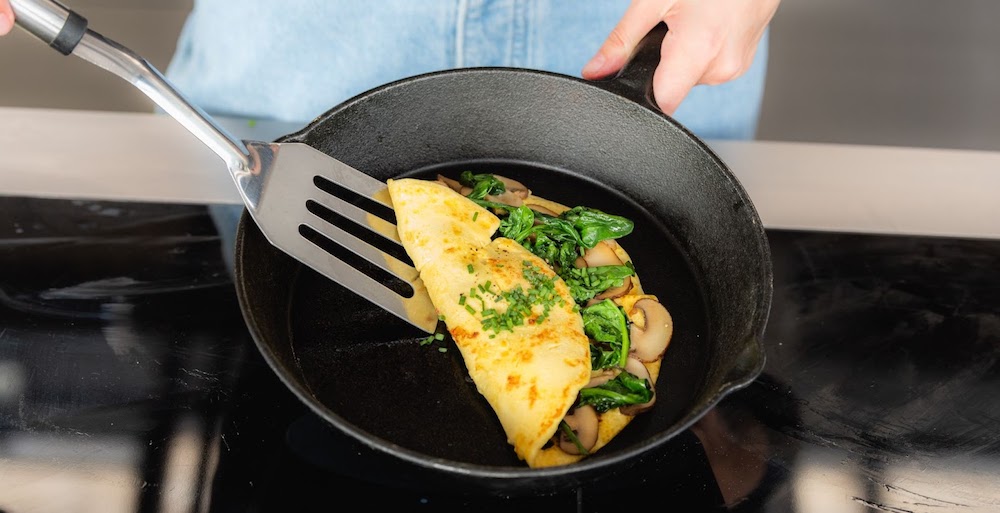News
Veganuary Hopes You’ll Resolve to Ditch Meat, at Least for One Month
Diet•4 min read
Reported
Understanding the science behind “lab-grown” food might help with acceptance.


Words by Björn Ólafsson
Consumers are ready for lab-brewed eggs, according to new research. The study, conducted by the synthetic biology company Formo and Singapore Management University, surveyed just over three thousand consumers on their willingness to try precision-fermented eggs and found that a majority of consumers would be interested in trying or buying the product. The research adds to growing buzz around the precision fermentation industry, sometimes called animal-free in addition to lab-brewed, which is currently predicted to reach a value of $36 billion by 2030. But just what are these foods and how are they made?
The future of the vegan egg market — like most alternative proteins — is somewhat up in the air. Still, at least some market predictors look good. According to research from the firm Technavio, the vegan egg industry is expected to grow by nearly $1 billion in the next five years.
Most vegan versions of eggs on the market today are made with plant-based ingredients, like chickpea flour, mung beans, turmeric and potato starch. Precision-fermented eggs, on the other hand, are made by tweaking bacteria to produce proteins identical to those found in animal eggs, though no actual animals are part of the process. It’s not really animal-based, it’s not really plant-based. “It’s a third category of products,” says Oscar Zollman Thomas, lead author of the research.

When it’s eventually sold in stores, the product will be packaged and sold as battered eggs — a yellowy liquid that can be poured into pans and fried into scrambled eggs or maybe an omelet. Since the technology underlying the processes is kind of akin to brewing beer or fermenting soy sauce, and there are no genetically modified ingredients in the final product, most precision fermentation companies don’t have steep regulatory hurdles to clear.
“People are ready to switch,” says Thomas, who is an employee of Formo. The company plans to launch the animal-free egg brand “What Comes Third” later this year. Research conducted by the group Innovate Animal Ag backs this up, finding similar consumer interest in egg alternatives. Most consumers are unaware of the egg industry practice of culling male chicks at birth but, upon learning of the practice, 73 percent of survey respondents felt the egg industry should find an alternative.
In this latest research, Thomas conducted an online survey of just over three thousand people, about a thousand each in the U.S., Singapore and Germany, to assess their hypothetical willingness to try or buy eggs made with precision fermentation.
Over half of the participants, in all countries, said they were willing to both try and buy the product. German consumers were the most keen to sample the eggs, with Singaporeans following and Americans the least interested of the three groups.
The reasoning for the responses varied by country. Germans were more motivated by the product’s better animal welfare and reduced antibiotic use while Singaporeans’ curiosity was piqued by the health and price benefits. Americans were mostly wooed by perceived health benefits, and the lack of cholesterol in the product. All participants also indicated curiosity as a prime reason for wanting to try it.
This is in line with other research — German animal product consumption is steadily declining, as much of its population identifies as flexitarian, motivated to help animals and the environment through their food choices. Americans tend to care more about health and taste.
The study was conducted in early 2023, when the prices of animal-based eggs were skyrocketing globally. This framing may also have boosted consumers’ willingness to try the product.
Vegans and vegetarians were most enthused by the product, followed by flexitarians and then people who choose to eat meat. While seemingly intuitive, this is actually a departure from previous research — flexitarians have tended to be the ones most excited about cultivated or other fermented alternatives.
It may be that there’s more consumer awareness now about the precision fermentation industry, or it could be that how the product was described in the survey unlocked their openness to try it.
Similar to previous research conducted on the consumer acceptance of precision-fermented cheese, participants read an accurate, scientific description of what precision-fermentation was. It’s worth pointing out that that’s not how supermarkets or restaurants menus usually present food. Consumers are often beset by all sorts of claims, some of which are driven by bad actors.
Thomas agrees that this could be a challenge when it comes time to actually market their product. “Nothing happens without people being aware of what it is,” he says, adding that consumer education will be a big hurdle for the industry.
What Comes Third is expected to launch in the latter part of this year in restaurants in Germany, and supermarkets there sometime in 2024. They’ll be pricey at first, sold at higher end cafes and restaurants, with hopes of eventually reaching price parity with premium eggs.
Ultimately, a switch to egg alternatives, including those made with precision fermentation, means a product made with all the nutrition of animal eggs — protein and B vitamins — minus the cholesterol and animal suffering.
More eggs made with precision fermentation means fewer from industrial egg farms, where birds are kept in tiny cages and exposed to a near-constant stream of bright light to encourage egg production. And since zoonotic disease festers in factory farms, a larger shift to egg alternatives would also lower the risk of future pandemics